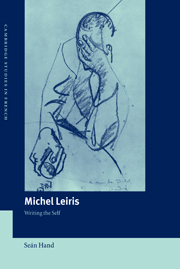Conclusion: locating Leiris
Published online by Cambridge University Press: 22 October 2009
Summary
Existing between two deaths, the first inherent in the original apprehension giving rise to self-consciousness, and the second projected in the final and unknowable termination of selfhood, Leiris's autobiographical practice emerges at the end of the twentieth century as a comprehensive and exemplary achievement in writing the self, to be placed historically in a lineage including Montaigne and Rousseau. Progressively exploring and exhausting inherited metaphysical or ideological resolutions to self-identity and the place and form of its writing, Leiris's autobiographical quest moreover arguably stands as a classic example of the century's most radical intellectual investigations, to be ranked here alongside key texts by Freud, Sartre, or Lévi-Strauss. Though historically grounded assertions about canonic status are still premature, such claims will certainly be boosted by the forthcoming publication in Pléiade form of the entirety of Leiris's œuvre. What is certainly clear already is that Leiris represents one of those key French writers of his time who, in the words of Michel Foucault, shattered a ‘founding self-evidence of the subject’, and generated exemplary and transgressive forms for an interrogation of delimitations that demonstrated how this subject could no longer be taken to have ‘cette forme originaire et autosuffisante que la philosophie classiquement lui supposait’.
- Type
- Chapter
- Information
- Michel LeirisWriting the Self, pp. 202 - 205Publisher: Cambridge University PressPrint publication year: 2002



